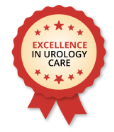Interstitial Cystitis: What You Need to Know
by Dr. Alex Shteynshlyuger, a board-certified urologist and specialist in the treatment of urinary problems in men and women including frequent urination, burning with urination and urinary retention.
If you have any questions, to schedule a consultation or if you need a second opinion, please contact us or call: 646-663-4151
What is Interstitial Cystitis and Bladder Pain Syndrome (IC/BPS)?
Interstitial Cystitis and Bladder Pain Syndrome
Interstitial cystitis (IC) is a collection of multiple urinary and pelvic symptoms that often coexist. A necessary requirement for a diagnosis of interstitial cystitis is that it is a chronic condition with symptoms lasting for 6 weeks or more. Practically speaking, a diagnosis of interstitial cystitis with symptoms lasting less than 3-6 months is rarely correct. For many patients, it takes years to arrive at the correct diagnosis.
Interstitial Cystitis is Not a Single Problem
The cause is not clearly understood but it appears to be caused by more than one underlying problem some of which may be muscle spasms, hyperesthesia and resultant overactive bladder symptoms. The symptoms of interstitial cystitis vary from mild to severe and are different in each patient. Symptoms of IC can wax and wane and change with time. The most common symptoms experienced by patients with interstitial cystitis are:
- Lower abdominal and pelvic pain that is often worse when the bladder fills.
- Pelvic and/or perineal pain/tenderness.
- Pressure or discomfort in the pelvic/bladder area.
- Urinary urgency.
- Urinary frequency.
- Pain with intercourse in women.
Interstitial cystitis is also called painful bladder syndrome or bladder pain syndrome (BPS). This condition is much more prevalent in women than in men. It is important to understand that interstitial cystitis is a diagnosis of exclusion. In other words, it is a diagnosis given to patients when no other causes of their symptoms, such as infection, cancer, or anatomical abnormalities, can be identified.
Do I Have Interstitial Cystitis?
There is no single medical test that can tell whether a person has IC/BPS. A diagnosis of interstitial cystitis is made only after an exhaustive evaluation of the urinary tract, which typically requires empiric treatment with medications, tests to exclude urinary tract infections, testing for STDs, and a cystoscopic examination of the bladder to exclude inflammation and tumors. Urodynamic evaluation, which involves instilling the bladder with water and measuring pressure changes as it fills and empties, is often performed to evaluate the function of the urinary bladder. Therefore, a diagnosis of interstitial cystitis cannot be made after only one or two visits to the doctor. It typically takes months to arrive at the diagnosis.
Other Problems that May Mimic Interstitial Cystitis
Other conditions that may mimic interstitial cystitis include ulcerative colitis, Crohn’s disease, and irritable bowel syndrome. Severe overactive bladder, either primary or secondary, can also mimic IC symptoms. Distal ureteral stones may cause similar symptoms. Women with endometriosis may sometimes experience symptoms that are misdiagnosed as interstitial cystitis.
In our practice, we find that more than 90 percent of women referred to us with a presumptive diagnosis of interstitial cystitis have been misdiagnosed. Essentially, nearly every woman who is told that she has interstitial cystitis by an urgent care doctor or physician’s assistant has received the wrong diagnosis.
The good news is that many women with a presumptive diagnosis of interstitial cystitis have an identifiable cause of their symptoms, which may include infection or neuromuscular issues, and treating the underlying cause often relieves the symptoms.
Interstitial Cystitis: Can It Be Successfully Treated?
There is a lot of misconception about interstitial cystitis and bladder pain syndrome. Part of the problem is that accurate diagnosis is challenging. Interstitial cystitis is frequently caused by a convergence of multiple problems at the same time. Because multiple symptoms coexist, a single approach to treatment often does not result in successful relief of symptoms. The same treatment does not work for every person with IC/BPS. Treatment must be tailored to each patient’s needs based on their individual symptoms and response.
Interstitial cystitis can be effectively treated. Most women experience significant improvement in their quality of life and resolution of symptoms with appropriate treatment. Unfortunately, due to the nature of the problem and the empirical approach to treatment, several different treatments or combinations of treatments may need to be tried before the patient obtains good relief of IC symptoms. For this reason, successful treatment can take months to identify.
How is Interstitial Cystitis Diagnosed?
To diagnose interstitial cystitis and bladder pain syndrome, a careful review of symptoms, laboratory tests, and a physical exam may need to be performed. Interstitial cystitis is typically a diagnosis of exclusion. The first requirement for the diagnosis is that the symptoms be persistent for at least a few months. The second requirement is that a thorough evaluation of the pelvis and urinary tract is performed to exclude anatomical and infectious causes for the underlying symptoms, such as pelvic pain, urinary frequency and urgency, and discomfort.
There are some physical signs associated with the condition. In patients with non-ulcerative interstitial cystitis, which is the more common subtype, pinpoint hemorrhages called glomerulations may be seen in the bladder wall. However, this is a nonspecific finding and also appears with other causes of bladder inflammation. In patients with ulcerative interstitial cystitis, cystoscopic examination may reveal Hunner’s ulcers, which are red, bleeding patches on the bladder wall. Again, these are not necessarily specific to the diagnosis and similar findings may be seen in overdistended or irradiated bladder.
Interstitial Cystitis Treatment: Multimodal Approach
A combination of treatment approaches may be necessary to treat interstitial cystitis symptoms. A multipronged treatment approach with lifestyle changes, physical therapy, bladder training, and medications is often effective in treating IC/BPS. Some people find that alcohol, caffeine, and acidic foods worsen their symptoms and removing these foods and drinks from their diet can help improve IC symptoms.
At New York Urology Specialists, we approach interstitial cystitis treatment individually for each patient. Our initial treatment targets the most prominent and bothersome symptoms. If the main symptom is pain, we approach treatment based on the most likely underlying cause of pain. Sometimes the treatment may involve pelvic floor therapy, medications, or a minimally invasive procedure.
A number of medications are effective in treating symptoms of interstitial cystitis, including anticholinergic medications and beta-3 agonists (often used for the treatment of overactive bladder), neuromodulatory medications (sometimes also used for the treatment of depression), and replenishing the lining of the urinary tract with hyaluronic acid [1]. Local anesthesia may be helpful in patients with focal symptoms. Botox injections in the bladder help some patients with interstitial cystitis. Sacral neuromodulation with Interstim (an implantable device) has proven helpful in some patients with refractory IC. Intravesicular instillation of medications may benefit some patients with interstitial cystitis. Elmiron, an oral medication for IC, can help improve pain and discomfort in many patients. In patients with severe, intractable interstitial cystitis, surgical treatment may be necessary.
Why Choose New York Urology Specialists for Treatment of Bladder Pain and Discomfort?
- All treatment is performed by a Board-certified urologist experienced in treating men with symptoms of frequent urination, urinary urgency, urinary incontinence and bladder pain using medical therapy, minimally invasive therapies, lasers and open surgery.
- We are one of the few practices in the region to offer a full range of options for treatment of urinary problems in men and women
- We offer treatment options for overactive bladder, UTI, and urinary incontinence in our office which avoids the risks, costs, and recovery from general anesthesia.
- Extensive Experience: Hundreds of men and women have treated successfully using medical therapy, Botox for overactive bladder, Interstim for frequent urination and tibial neuromodulation.

If you have any questions, to schedule a consultation or if you need a second opinion, please contact us or call: 646-663-4151
Medicare and major insurances accepted. Urologist. We offer affordable rates and financing options.
|
If you have any questions, to schedule a consultation or if you need a second opinion, please contact us or call: 646-663-4151
We offer affordable, highest-quality urology care with or without insurance. Find out our office hours or directions to our office. We offer weekday, weekend, and evening office hours.

If you have any questions, to schedule a consultation or if you need a second opinion, please contact us or call: 646-663-4151
Dr. Alex Shteynshlyuger is a board-certified urologist in NYC who specializes in treating men and women with urinary problems including frequent urination, difficulty emptying the bladder, urinary urgency and incontinence.


 Schedule an Appointment with Dr. Shteynshlyuger:
Schedule an Appointment with Dr. Shteynshlyuger: